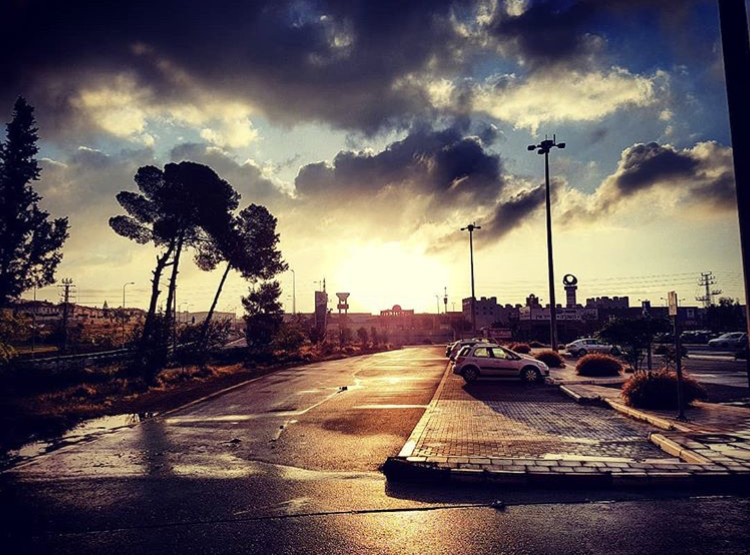Israel's burgeoning cycle scene looks to break away from the pack
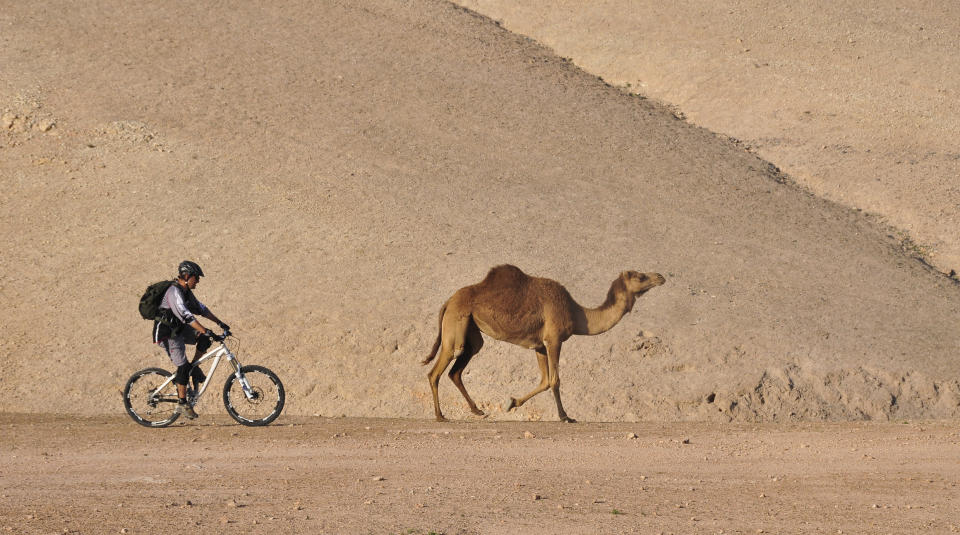
It’s 28 C degrees on this March day in the desert and the Shabbat is fast approaching. We’re in southern Israel, in the city of Arad. The Kidod Range unfolds around us. And to the south, the seemingly endless sand and rock of the Negev. A forlorn quality pervades these streets. This was once a thriving tourist spot, the place to stay when visiting the Dead Sea or Masada, a short drive away. Today it’s fallen on grittier times, its hotels neither as modern nor as spacious as the resorts closer to the attractions. What passes for action on this Friday afternoon is the groups of Ultra-Orthodox men, in their black coats and thick fur hats, rushing home on the sidewalks.
And there’s us… in brightly-coloured spandex, brand-new bikes and sunglasses. We’re here for the Arad Gran Fondo, a 155-km race that will begin at the Dead Sea, stretch deep into the Negev, before climbing towards the Judean Mountains, then looping back to the start. But that’s tomorrow. Today we’re doing a warm-up sprint, most of it uphill, from the base of Masada to the top of Arad.
Though first we have to find the start line, and that’s where things kind of go awry.
Waiting at our drop-off in Arad, with very few bikers in view, it’s not immediately evident that cycling is such a booming sport in Israel. It very much is. Indeed, a Montreal real estate billionaire, Sylvan Adams, is now building an Olympic-calibre velodrome in Tel Aviv, the country’s first. He’s also supporting a wide network of cycling lanes around the city. The Giro D’Italia, a race that’s second only to the Tour de France on the pro circuit, will kick off this May with its first three stages here. And tomorrow’s Gran Fondo, which is now in its 6th year, is expected to draw some 1,000 cyclists, making it the largest event of its kind in the Middle East.
This is all new stuff. Cycling in Israel to date has typically looked one of three ways: There’s the fresh-air enthusiasts breezing along the Promenade in Tel Aviv, basking in the beauty of the Mediterranean. There’s the electric-bike lunatics in Jerusalem that careen full-throttle down the sidewalks, presuming, I guess, that pedestrians will get out of the way. E-bikes are a new phenomenon, though fast-growing and extremely popular, at least among those who’ve yet to be run over by one. Then finally there are the road racers, the ones that belong to cycling clubs across the country. These are the same sort of weekend warriors we see in Canada, speeding along in tightly-packed pelotons, wearing snug-fit neon.
(There has yet to be much of a fourth group, the bike commuter with panniers on the back. That’s because cycling lanes still remain somewhat of a rarity, and trying to share narrow roads with Israeli drivers isn’t a life-enhancing arrangement).
The road to Masada
Thankfully, that’s not a concern for us today. The Gran Fondo organizers have kindly paired their two Canadian media participants with a junior elite team from Haifa. Together we’ll leave from a designated spot in Arad and cycle the 20km downhill to Masada. The route will take us along the back way, winding through the Judean desert, rather than on the far busier highway that skirts the Dead Sea. Mind you, we have to find the route first, which we assume will be pretty straightforward. Arad is not a big place and we have the young Haifa teens as guides. We just need to try to keep up behind them.
Which is what we do, leaving the city and descending into the desert by way of a series of steep switchbacks, then straight drops, with the traffic whizzing past, the cliffside nearing and my fingers leaving imprints in the handlebars… and then we stop.
Phones are pulled out, maps are checked and among the guys there’s suddenly a lot of squinting towards the direction we’ve come, which is not good sign. I don’t know Hebrew, but I know disappointment when I see it. Apparently somewhere way, way up there we took a wrong turn.
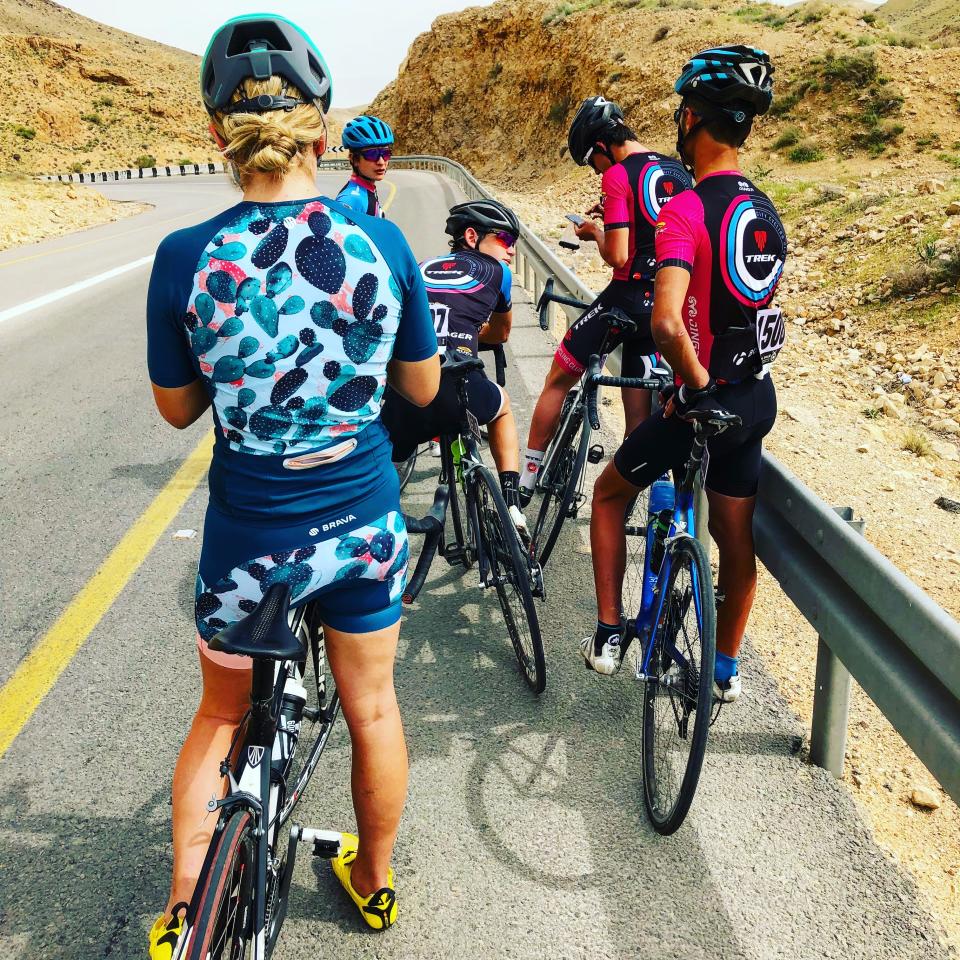
I should probably pause at this point and say that this minor misadventure aside, this afternoon these boys are nothing short of saintly. As we didn’t receive much of a briefing beforehand and our ability to communicate with them limited, I don’t know what sins they’ve committed to get saddled with us, but they clearly could have blazed off from the start. And they certainly could have opted to provide fewer warnings about the tricky turns or dangerous sections of cross-winds. These are teenagers after all. That they would immediately provide such generous guidance, without knowing much English, speaks volumes of their character.
Climb back up we go, turn by turn, until we eventually we return to square one back in Arad. Then more cycling around in search of the right street, passing more Ultra-Orthodox on the sidewalks, making this desert scene feel even more exotic and surreal. Yet eventually we spot some very shiny figures zipping past the sand dunes in the far distance.
And we’re off…
Twenty kilometres on a bike provides ample time for reflection, with some thoughts closer to the surface than others. The first that occurs to me is that the pavement we’re riding on is immaculately pristine for what’s obviously a back road. Did they just re-do it this morning, or is every road here so lovingly kept? And pulling the lenses back a bit… what’s actually going on here? Is this section the relaxed part of the ride? Then we arrive and race back? If so, what time does the race start, and where is the finish line? Along the way, will there be aid stations? (Because I’m not seeing any so far) And what if we get a flat? The organizers very kindly provided our bikes, but were we supposed to bring extra tubes and repair kits?
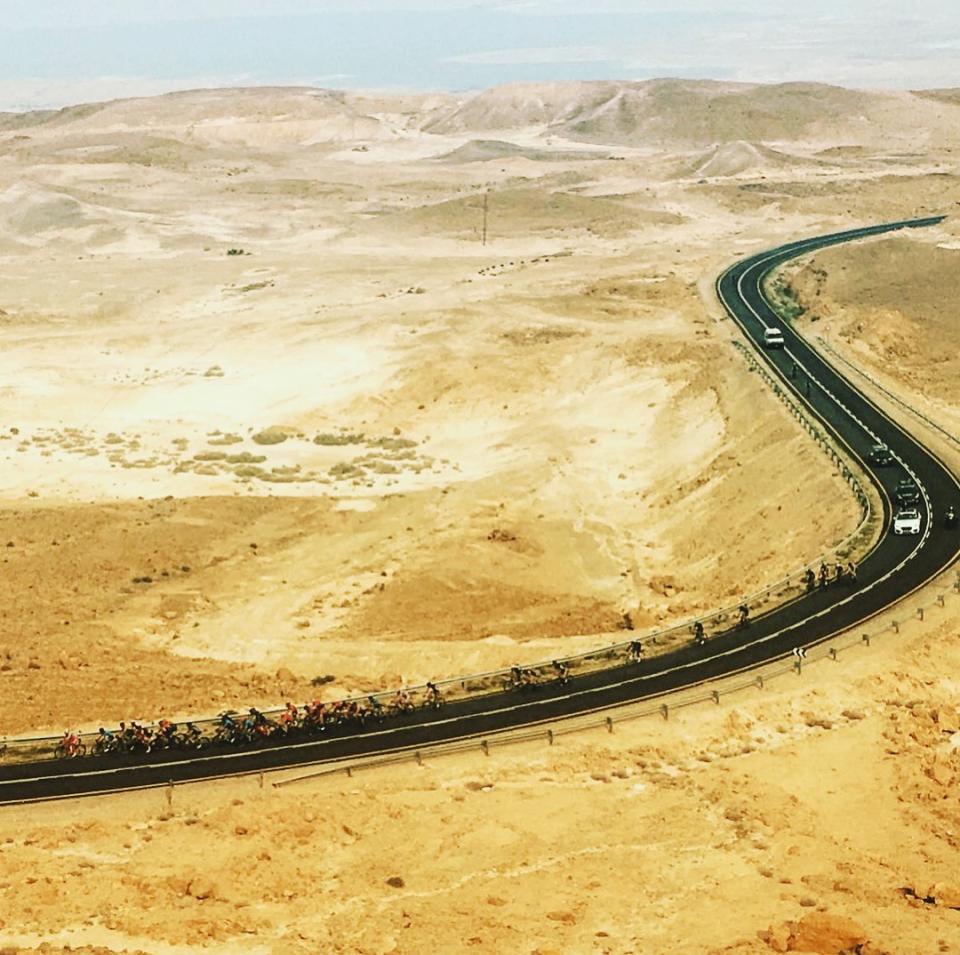
Racing in the Holy Land
These are all valid questions, though they may reflect a distinctly Canadian, or maybe North American, way of thinking. Israelis don’t seem to sweat this stuff, or if they do, it’s not apparent. Having had the good fortune to race in a few events in the past, including an open water swim in the Sea of Galilee and an Ironman-distance triathlon, I’ve discovered that Israel’s passion for sports isn’t always matched by an equivalent obsession with structure. It’s not that things are disorganized exactly, it’s more that there seems to be an overriding belief that everything will eventually work out as intended. Or at least, close enough. I can only assume that when all the countries around have wanted to wipe you off the map since your day of inception, there are just some things you learn to worry about and some things you don’t. Whether everyone on this Friday afternoon cycle knows if the race back from Masada begins at 2pm or 2:30pm definitely falls in that second camp.
And yet… Israel is now actively working to boost its profile as a destination for recreational athletes, a group that is largely younger, wealthier and more internationally diverse than the faith-based tourism that the country has so long attracted.
Israel has largely succeeded in this mission with the Jerusalem Marathon, a 35,000-participant race that’s now recognized in running circles as a world-class, if extremely arduous, event. Other local races have had less luck. Israman, the Ironman distance triathlon in Eilat, has only grown in popularity over the past 20 years, yet it continues to be an overwhelmingly Israeli event. This remains a sore point for organizers, given that it’s held every January in a sunny and warm resort town, with a major airport. Talk to any race director here and it will be soon mentioned that similar races in far-flung locations like Durban and the Azores manage to attract an increasingly international crowd.
In this regard, tomorrow’s Gran Fondo is still in its early years, relatively speaking. Organizers say there’ll be cyclists from 30 countries here but privately lament that the race has yet to be fully embraced as worthy of the journey. Their angst is understandable as they’ve clearly done everything they can to make the event as appealing as possible, from ensuring the roads are in pristine shape to choosing Ein Bokek as the start. The Dead-Sea resort town has five-star hotels, incredible beaches and is an easy two-hour drive from the main airport in Tel Aviv.
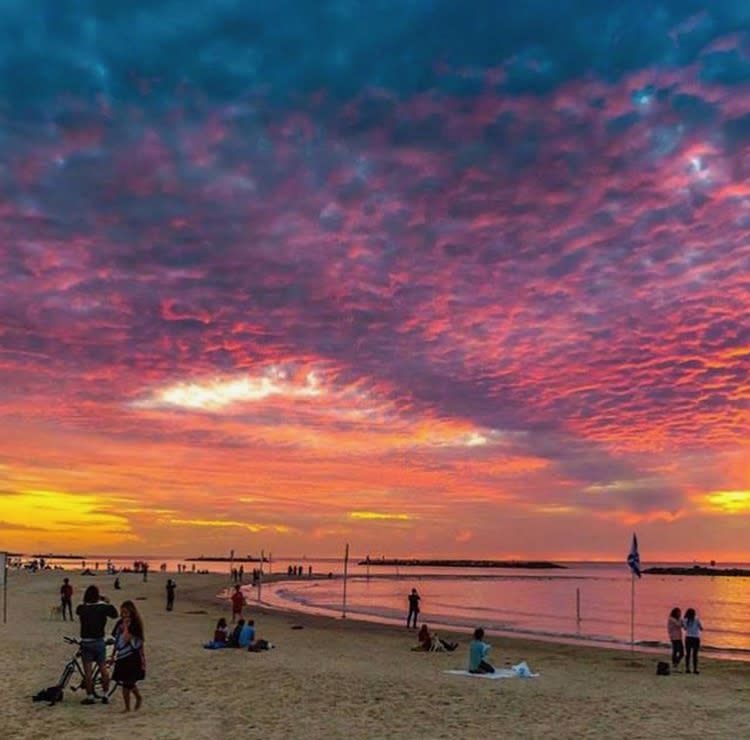
It’s too late for this year, but the hope is that the Giro D’Italia holding its first three stages in Israel in May will raise the country’s profile among cyclists. To nudge things along, there’s a contingent of Tuscan hoteliers here, seeking to build stronger ties between the two countries’ cycling communities.
Giddy up, already
Before we tackle the Gran Fondo, we need to get back to Arad from Masada, a ride that promises to be much less harrowing, though considerably slower and tougher than the trip out. There’s some 200 cyclists now gathered near the base of the mountain, waiting for the signal to go. Based on the quick briefing we received earlier in Arad, and the tone of the info blared out on the P.A. system, it seems evident that this will indeed be a race back.
At least that’s what appears to be understood by everyone else, who are now lining up under a big inflatable banner ahead, sorting themselves according to age or speed or some other variable that’s presumably just been explained. I find a spot well at the rear, a move with plenty of its own internal logic.
And once again we’re off… and here I’ll spare the painful details, except to say that the climbs were steep, the desert winds dry and dusty yet the scenery absolutely spectacular.
Focusing on the positive, it’s fair to say that it’s much easier to appreciate the views when you’re slowly climbing up the hills then when you’re zooming down them. Right now we have Masada to our left, and in the distance behind it, the Dead Sea and the Jordanian mountains. Everywhere else around us, there’s the empty expanse of Judea. It’s like a scene out of Lawrence of Arabia. And no sooner does that enter my thoughts, that I round a bend and see a family of camels clomping across the road at the most leisurely pace possible. I have no idea if they’re wild or just have a very relaxed shepherd. Probably the latter. Either way, they’re completely unconcerned about any cyclist being dumb enough to try to shove them on.
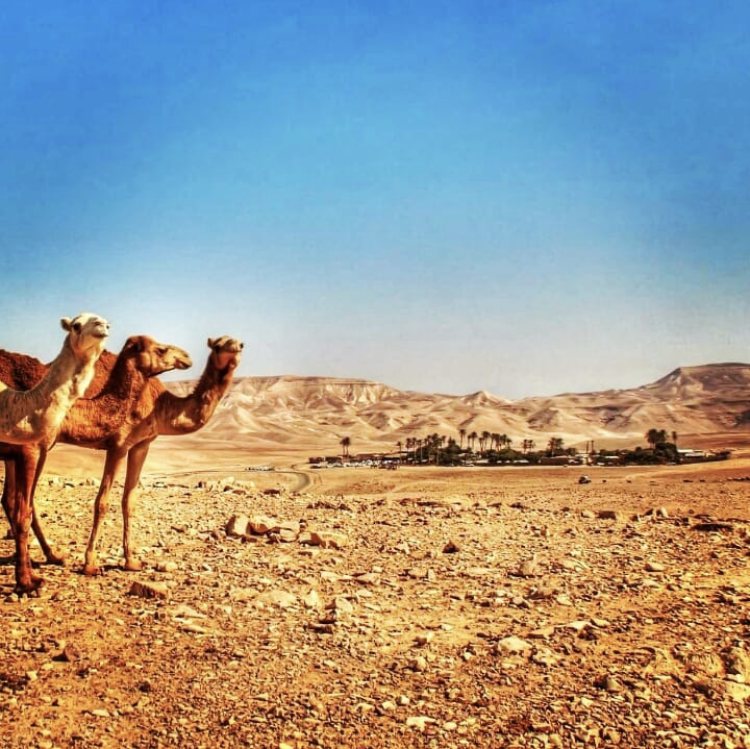
I later learn that during last year’s Gran Fondo a pack of camels sat on the road and refused to budge…. until a race official in a car had to honk them into very gradual, grudging action. Is it the same family or is the desert just swarming with these things? Beats me. But my one big regret is that I don’t get off my bike and capture this scene on video. I can’t. The finish line is just ahead and every fibre of my being needs this uphill journey to be done. (That we will be covering seven times this distance tomorrow morning is something that I’m not yet ready to consider.)
Air Force vision
Before that happens we get an interesting ask. Would we trial a pair of Everysight sunglasses throughout the race. They’re the brand-new product of an Israeli start-up that uses augmented reality (AR) technology designed for the visors of fighter pilots. The US$499 sunglasses come equipped with sensors that track distance, speed, heart rate and power generated. They also provide a map of the road ahead, along with audio and visual cues to keep up a certain pace. A digital dashboard appears on the lenses showing the data. There’s also a built-in HD camera as well speakers streaming music or providing feedback on your cycling.
To be candid, I anticipated the glasses would be a distraction, one more wrinkle to contend with while trying to complete the course. In addition, I wasn’t hugely keen on read-outs of hill gradients or updates on how frantically my heart was pounding. However, on our quick test run before the race, none of that proved an issue. The display was so subtly presented that I soon forgot it was there. Instead of having to check my watch, or look down at a screen on my handlebars, the typical places for such data, I can just glance at the info in front of me.
Race day dilemma
The morning of the race is a scary scene. The skies are dark grey and the winds are seemingly gusting in every direction. I can’t tell if this gale is coming in from the Dead Sea or billowing down over the mountains. Either way, it’s wreaking havoc. A giant inflatable Aroma coffee cup has been sheared from its tethering and is now bouncing on its side, threatening to break loose. The stage looks like it’s in danger of being blown over, and any bag, box or piece of plastic that could go airborne has now taken flight.
The 7 am start time is pushed back an hour to see if the conditions might settle. The weather report isn’t encouraging and already some of the teams have started to pack up. The course features some extremely steep climbs and sharp descents as well as a number of long stretches of wide open cycling in the desert. If the wind doesn’t significantly abate, the risk of racers being literally blown off the road is all too real. One by one the junior teams bow out. No coach is going to send a group of teens out for a 155-km ride in this, especially not when the gusts are said to even stronger in the south, the direction we’re set to go.
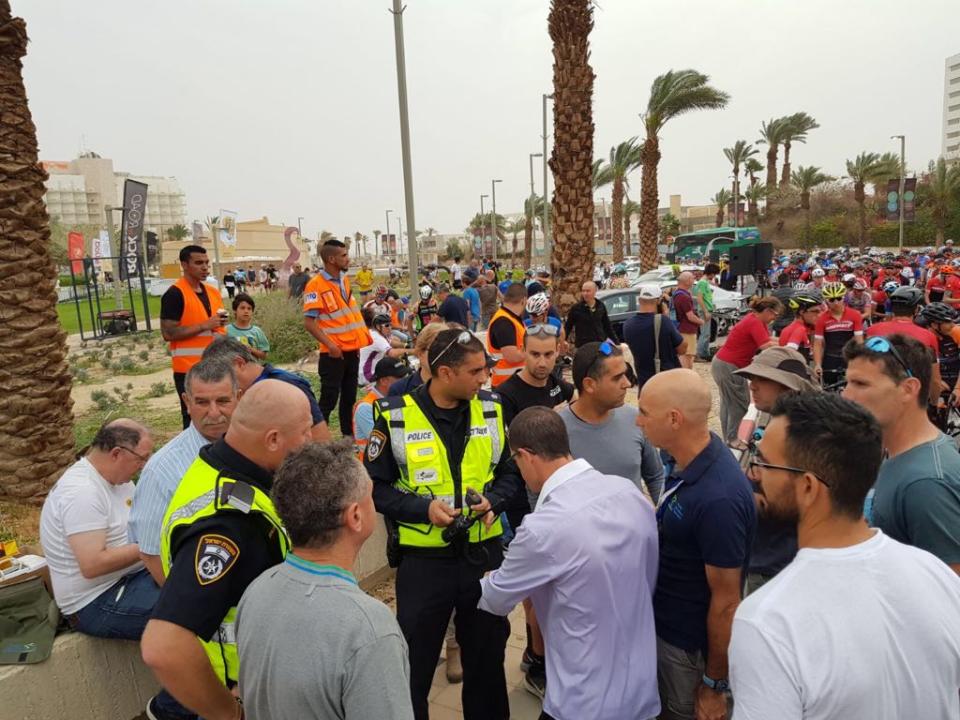
Options are being considered. One possibility is shrinking the route, though course logistics and road closings are tough to change on the fly, plus the question remains whether attempting any distance this morning is safe. As the clock ticks on, the window is closing. The plan was for all of the cyclists to be off the course by 3 pm. If the start is delayed any further, the race will impede traffic later into the evening, an allowance that would not be lightly. The race directors have a tough decision to make, and they have to do it now, or the police will make it for them.
At 9 am, with the winds continuing to howl, the race is scrapped. The news is neither a surprise nor, in truth, a huge disappointment to most of the remainder riders. The thought of cycling for up to seven hours in these conditions appeals to no one. For the Gran Fondo officials, of course, it’s a tremendous letdown. Months of planning, hundreds of thousands of dollars and no small amount of marketing has been invested in making this race as successful as possible. Today was meant to be another solid step in the evolution of cycling here, a springboard that the Giro in May would only boost higher. Yet in canceling they made the only call they could. Next year most of this crowd, and hopefully more, will undoubtedly be back, safe in the knowledge that organizers are holding the long-view. This is a blip. They’ll be plenty of races ahead. Cycling here is only getting started.
Note: I was a guest of Vibe Israel, a not-for-profit organization working to share Israel’s stories and build its brand in the world. They did not review or approve this article prior to publication.
